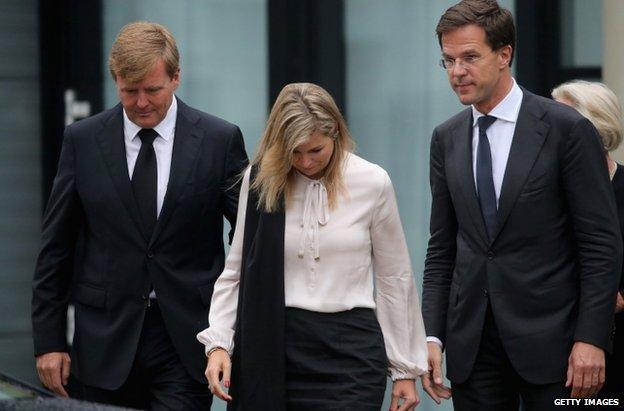MH17 plane crash: Dutch sadness turns to fury
- Published

King Willem-Alexander (left) and Queen Maxima met victims' families at a gathering in Utrecht
"Thanks a lot, Mr Putin, rebels and leaders of the Ukrainian government, for killing my sweet and only child. Suddenly she is not there any more. Shot out of the sky in a strange country where a war is going on."
Bereaved father Hans de Borst expresses his agony in a letter to those he feels are most responsible for the death of his daughter: one of 193 Dutch victims killed in the Malaysia Airlines plane disaster in eastern Ukraine.
The Dutch government on Monday hosted a gathering of victims' relatives. The setting was a bleak conference centre under cloudy skies near Utrecht. The King and Queen came to share their sympathy.
Black screens protected the families from the cameras' glare as they entered the building. There have been complaints about the media scrum at Schiphol airport in the moments after the relatives heard about the catastrophe. This time journalists were secured behind barricades.
Hans de Borst shows his front-page demand to President Putin to "bring my daughter back"
Hans told us he felt helpless: 'If there were Americans or Russians on board, troops would have been sent in. Even if it's just a sock, I want to see something."
Hans's personal tragedy reflects a widely held public sentiment: Dutch officials are being too soft.
Front-page images of militiamen holding children's toys aloft amongst the wreckage were the catalyst that began to shift sentiments from shock and sadness to fury and frustration.
Some feel as though their children are being used as propaganda tools in Russian President Vladimir Putin's conflict.
More bouquets were laid during the day on Monday outside Schiphol airport
"This was not our war. They're using our families as pieces of propaganda." Jeffrey was visiting a friend in the small town of Rosmalen, devastated by a double tragedy.
The Truggs and Wals went on holiday together. The families lived opposite each other. Three children, Tess, Liv and Sem grew up together. They used to play on the swing that now sways empty between their bouquet-laden gardens.
Most people welcomed Dutch Prime Minister Mark Rutte's warning that this was President Putin's last chance to show the world that he was willing to help. But there is increasing concern that the ultimatum may prove empty.
"Rutte is thumping the table but nothing is happening" - it is a phrase I have heard every day since 17 July - the day that many here refer to as "the Netherlands' 9/11".
Speculation has been voiced on social media that Dutch caution may be attributed to a type of "Srebrenica syndrome". In other words, a psychological trauma associated with Dutch peacekeeping troops' failure to prevent the 1995 massacre of more than 7,000 Muslim men and boys in Bosnia-Hercegovina.
Meanwhile, some people have turned their Twitter avatars black in protest at the failure to return the Dutch victims' bodies.
Four days after one of the worst air disasters in Dutch history, neither the prime minister nor any other world leader can answer the question hundreds of mourners are asking: "When will you bring our bodies back?"
On the wet lawn outside the conference centre, someone taught me a Dutch phrase to describe the prime minister's sharp words with Mr Putin, which translates roughly as "there's no bite in his bark".